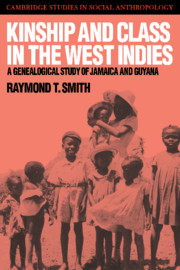Book contents
- Frontmatter
- Contents
- Preface
- Maps
- 1 Introduction: assumptions, procedures, methods
- 2 Kinship, culture and theory
- 3 What is kinship in the West Indies?
- 4 The structure of genealogies
- 5 Marriage in the formation of west Indian society
- 6 Modern marriage and other arrangements
- 7 Sex role differentiation
- 8 Household and family
- 9 Conclusion
- References
- Index
- Cambridge Studies in Social Anthropology
2 - Kinship, culture and theory
Published online by Cambridge University Press: 29 October 2009
- Frontmatter
- Contents
- Preface
- Maps
- 1 Introduction: assumptions, procedures, methods
- 2 Kinship, culture and theory
- 3 What is kinship in the West Indies?
- 4 The structure of genealogies
- 5 Marriage in the formation of west Indian society
- 6 Modern marriage and other arrangements
- 7 Sex role differentiation
- 8 Household and family
- 9 Conclusion
- References
- Index
- Cambridge Studies in Social Anthropology
Summary
The objectivity aimed at by anthropology is on a higher level [than other social sciences]: The observer must not only place himself above the values accepted by his own society or group, but must adopt certain definite methods of thought; he must reason on the basis of concepts which are valid not merely for an honest and objective observer, but for all possible observers.
Lévi-Strauss 1963The theoretical issues raised by this study are not new, but their implications for the analysis of Caribbean kinship have not been explored except in a few brief publications (Alexander 1976, 1977; Drummond 1980; Fischer 1974; R.T. Smith 1973, 1978a, 1978b, 1982a, 1984c, 1984d). This short chapter provides interested readers with a fuller, but not exhaustive, explanation of the concepts and theoretical principles only touched upon in the first chapter. There we established the following: (1) the study of kinship has been profoundly influenced by assumptions about the empirical, or necessary, universality of the nuclear family; (2) the perception of lower-class social life in the Caribbean has been conditioned by the ideological structure of colonial society; (3) the quantitative analysis of ‘family structure’ raises serious problems of definition which are often resolved to the detriment of understanding. These issues come to a focus in the meaning of ‘normal’ (see R.T. Smith 1973).
- Type
- Chapter
- Information
- Kinship and Class in the West IndiesA Genealogical Study of Jamaica and Guyana, pp. 21 - 30Publisher: Cambridge University PressPrint publication year: 1988



